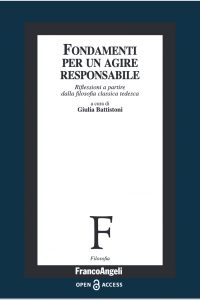 Abstract:
Abstract:
The paper aims at showing the fundamental role played by the agent’s knowledge and will to justify the attribution of an action as their responsibility, in Hegelian terms. However, this perspective does not remain anchored to a subjectivist evaluation of action: it is, in fact, only within the social context that the subject’s knowledge and will reach their concrete realization, reformulated as knowing and wanting what is rational in and of itself, valid in the social context (in the objectivity). First of all, the complementarity of intelligence and will is analyzed, starting from Hegel’s Psychology, in order to show how the concept of free will, understood as a thinking will, counts as the foundation of Hegel’s practical philosophy, as well as of Hegel’s theory of imputation. After that, it is argued that the knowledge required in order for an action to be imputed as the agent’s responsibility represents a subjective right, but at the same time also a duty of the agent, understood as a thinking being. Within the Morality section of the Elements of the Philosophy of Right, the subject’s knowledge is articulated into three levels, which correspond to the three elements that define action in Hegelian terms and to the three levels of imputation. From the development of the rights of the subjective will and of knowledge it emerges that the action is imputed to the agent not so much on the basis of the effective knowledge that she/he possessed at the moment in which she/he was acting, but rather on the basis of the possibility of knowing, expressed by Hegel’s claim for which the subject “was able to know” that something is right or wrong. Added to this is the normative claim of having to know (“you should have known”), the Sollen. The result of this path is the following: as the basis of the attribution of responsibility Hegel recognizes subjective conditions, exposed within Morality, but also objective conditions, which in Morality are anticipated, in order to find maximum expression in Ethical Life.
Keywords: Hegel, action theory, imputation, responsibility, knowledge, will.
The volume is available in Open Access at this link: https://series.francoangeli.it/index.php/oa/catalog/book/510.

